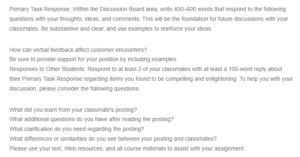Verbal Feedback in Customer Encounters
Business representatives must choose words carefully when providing customers with verbal feedback. Since the choice of words affects comprehension, employees should consider their customers’ skill set, education level, and experience. For instance, if the business representatives use words that do not exist in the customers’ vocabulary due to educational limitations, then there may be confusion. Also, employees should consider their customers’ backgrounds before deciding which words to use when addressing them. In a nutshell, the choice of words when issuing verbal feedback is as important as the message itself.
Nasr et al. (2018) aver that customers want to feel connected when interacting with business representatives. A connection is attained through friendly communication and rapport building. Employees who interact with customers should be polite and show customers that they care. A good example is when a customer at a retail store inquires about specific cleaning products. Instead of only directing customers to a shelf where such products are located, the store attendant may as well go ahead and ask for what purpose they are buying the products. That way, they will create a rapport as the attendant guides the customer. Subsequently, a customer who feels cared for and connected to employees at a business establishment is likely to return.
Another aspect of verbal feedback that affects customer encounters is the level of control. Customers always want to feel in control, and the transaction highly depends on their decision (Lucas, 2022). Frontline employees attending to customers should communicate with employees in a way that gives customers power (Nasr et al., 2018). For instance, if a customer wants a price cut for a specific product, the employee should not dismiss them if it is not possible. Instead, they should politely reply that it is beyond them and plead with the customer to consider buying the item at the current price. Frontline employees should avoid using words that make them seem overbearing against the customer.
Also, business representatives should avoid being abstract and using overly formal responses while issuing verbal feedback. It is tempting for an employee to switch to a formal tone when responding to complex customer complaints to sound professional (Leung et al., 2022). While that should not entirely be frowned upon by the customers, the employee should avoid using abstract words that address a common problem encountered by other customers. Instead, a business representative should use words that address the specific customer issue without necessarily referring to other customers’ issues. For instance, it sounds insensitive for a business representative to declare that other customers have never raised a similar complaint about a product in the past. Employees should use language that captures a company’s policies while asking the customer what they may do to satisfy their needs.
Moreover, verbal feedback during customer encounters determines whether a customer will make a transaction and whether they will return to patronize the business again. Using appropriate verbal feedback makes customers feel a connection with a business. Also, positive feedback goes a long way to make customers feel in control, which makes them feel valued. Another important aspect of verbal feedback identified is a need to avoid formality when dealing with a customer issue. While explaining company policies, the customer should feel a personal touch with the company representatives. It is essential to figure out what escalates customer emotions to make changes that give customers a sense of satisfaction.
References
Leung, E., Lenoir, A. I., Puntoni, S., & van Osselaer, Stijn M. J. (2022). Consumer preference for formal address and informal address from warm brands and competent brands. Journal of Consumer Psychology. https://doi.org/10.1002/jcpy.1322.
Lucas, R. W. (2022). Customer service: skills for success (7th ed.). Mcgraw-Hill Education.
Nasr, L., Burton, J., & Gruber, T. (2018). Developing a deeper understanding of positive customer feedback. Journal of Services Marketing, 32(2), 142–160. https://doi.org/10.1108/jsm-07-2016-0263.
ORDER A PLAGIARISM-FREE PAPER HERE
We’ll write everything from scratch
Question
Primary Task Response: Within the Discussion Board area, write 400–600 words that respond to the following questions with your thoughts, ideas, and comments. This will be the foundation for future discussions with your classmates. Be substantive and clear, and use examples to reinforce your ideas.

Verbal Feedback in Customer Encounters
How can verbal feedback affect customer encounters?
Be sure to provide support for your position by including examples.
Responses to Other Students: Respond to at least 2 of your classmates with at least a 100-word reply about their Primary Task Response regarding items you found to be compelling and enlightening. To help you with your discussion, please consider the following questions.
What did you learn from your classmate’s posting?
What additional questions do you have after reading the posting?
What clarification do you need regarding the posting?
What differences or similarities do you see between your posting and classmates?
Please use your text, Web resources, and all course materials to assist with your assignment.

